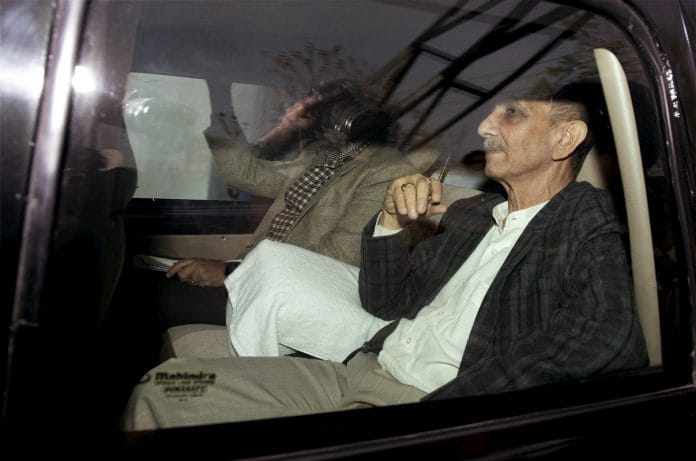Kashmir peace negotiator Dineshwar Sharma relieved of northeast duty; former top RAW officer to handle talks with ULFA and 2 Manipur rebel outfits.
New Delhi: The appointment of a new interlocutor for the northeast, at a time when the Centre’s peace talks with a faction of the United Liberation Front of Asom (ULFA) is believed to have reached a crucial stage, has come as a surprise for security experts.
The Centre earlier this month appointed a new peace negotiator, replacing former Intelligence Bureau chief Dineshwar Sharma, to push the dialogue with the Arabinda Rajkhowa-led faction of the ULFA and two Manipur outfits – United People’s Front (UPF) and Kuki National Organisation (KNO).
However, a source close to Sharma, who was appointed Kashmir interlocutor in October, told ThePrint that he wasn’t expecting to be relieved of the northeast assignment.
The task has now been given to A.B. Mathur, a former special secretary of the Research and Analysis Wing (RAW).
“Apart from a PR exercise for Kashmir, one of the reasons Sharma was removed could be the fact that talks with the ULFA are almost over. There’s nothing much for Mathur to do,” said the source.
The Arabinda Rajkhowa faction of the ULFA, a separatist outfit seeking to establish a sovereign Assam through an armed struggle, has been holding talks with the central government since a split in the organisation in 2011.
UPF and KNO are both umbrella organisations representing various factions of Kuki, Zo, Paite and Mhar groups.
A 1975 batch IPS officer of the Madhya Pradesh cadre, Mathur was transferred from the Intelligence Bureau to RAW in 2007. It is yet to be announced if he will also be handling the political dialogue with the National Democratic Front of Bodoland, another separatist group from Assam.
While Mathur will hold talks with the Assam and Manipur outfits, R.N. Ravi, a former special director of the IB, is currently handling the Naga issue on behalf of the Centre.
What led to the change
Security analysts and northeast experts are of the view that Kashmir is a priority for the Modi government and it wants to keep Sharma free from additional responsibilities so that he can focus his attention solely on his new task.
After the exit of P.C. Haldar, an ex-IB chief who was Sharma’s predecessor in the northeast, the peace process has become somewhat shaky, said Rakhee Kalita, associate professor at Cotton University, Guwahati, who has edited several books on insurgency in the region.
“With the new interlocutor, both sides are freshly interfacing each other. I believe there was faith in P.C. Haldar as a long-standing friend of the negotiators both on the side of government and the outfit,” Kalita, whose forthcoming book on ULFA will soon be published by Oxford University Press, told ThePrint.
In October last year, UPF leader Calvin H. expressed his concern of an overburdened interlocutor having any time for them. Since Sharma took over only in July 2017, UPF only managed to have one round of talks.
Seilin Haokip, the spokesperson of KNO representing 17 Kuki outfits, however, welcomed the change citing Mathur’s seniority over the previous interlocutors and his experience in Churachandpur, the epicentre of Kuki militancy.
“He has better understanding of the issues of our people since he has served as superintendent of police in Churachandpur and Tamenglong,” Haokip said. “I think the government has made a good decision.”
Mathur is the third interlocutor after Sharma and Satyender Garg (currently the joint secretary of northeast division in the home ministry) for the Kuki groups since they began the dialogue process after a ‘suspension of operation’ agreement was signed in 2008.
UPF and KNO are seeking a political settlement to their collective demand for a separate state within India.
New regime, new interlocutors
According to insurgency experts, while a change of regime at the Centre often leads to the appointment of new interlocutors, this could derail the progress a political dialogue could have reached.
Haldar, a retired 1970 batch IPS officer of the Bihar cadre, was a case in point. With his background of service in the Subsidiary Intelligence Bureau in Kohima and as director of IB from 2007 to 2009, he was seen to be the most suitable officer for talks with ULFA and NDFB in 2010.
Sources said that Haldar’s protest against the announcement of ST status to six communities in Assam, a key election promise that seemed to have worked for the BJP both in the 2014 general elections and assembly elections in 2016, cost him his job as an interlocutor for Assam.
Moreover, considering he was appointed when Congress was in power both at the Centre and the state, Haldar’s extension being denied beyond 31 December 2016 didn’t come as a surprise, the sources added.
Another security expert who spoke on the condition of anonymity told ThePrint that ULFA will not settle for any ‘peace accord’ unless it is ratified by Parliament, given their past experience with the Indian government on the Assam Accord, signed with the leaders of the Assam Agitation in 1985.
While the pro-talks faction of ULFA has dropped the demand for sovereignty, it is pushing for greater autonomy for indigenous communities within Assam.






